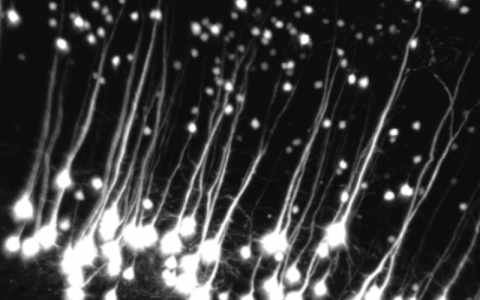
Julia Harris to open Sleep Lab at SWC
We are pleased to announce that Dr Julia Harris will join the Sainsbury Wellcome Centre as a Group Leader in January 2024. Her lab will study how sleep mediates computational and energetic changes in the brain that are crucial for survival.
“We know that sleep is vital for learning, consolidating memories and energy restoration. But what happens in the brain during sleep is a fundamental mystery. We are delighted that Julia Harris will start her Sleep lab at SWC to research this understudied scientific topic. With Julia’s expertise, we are confident we will make significant advances in understanding the basic mechanisms of sleep in healthy brains and open up new avenues to explore what happens when sleep goes wrong,” said Professor Tom Mrsic-Flogel, Director of SWC.

Having completed her undergraduate degree at Oxford University, Julia Harris joined UCL’s 4 Year Wellcome PhD in Neuroscience, where she studied brain energetics with David Attwell, using a combined theoretical and experimental approach. In 2014, she was awarded an Imperial Junior Research Fellowship to work between Bill Wisden’s lab at Imperial and Denis Burdakov’s lab at the Francis Crick Institute, switching to the in vivo study of sleep. She then joined Andreas Schaefer’s lab at the Crick, where she worked with automated behaviour settings and large-scale electrophysiology within the olfactory system.
Julia is now combining her experience in brain energetics, sleep, behaviour and olfaction to study circuit reorganisation during sleep, from synaptic to population-level changes. "We feel smarter, happier and energetically refreshed after a good night of sleep, but how this happens is still a mystery! My lab aims to understand the ways that circuit changes during sleep impact both neural computation and energy use, so that we wake up each morning with brains that are increasingly optimised for our environment," said Julia Harris.
The research conducted in the Harris lab will follow the activity of individual neurons across cycles of wake and sleep. The team will examine the cellular mechanisms involved in sleep-mediated circuit reorganisation and how these changes influence and refine behaviour across repeated cycles of wake and sleep. In addition, the Harris lab will explore what happens when sleep goes wrong, including the sleep disruption that accompanies early maternity and disease-related sleeping problems.
The Harris lab will be looking to recruit technicians, postdocs and students to join the quest to understand the role that sleep plays in managing computational and energetic requirements that are crucial for survival.
To find out more, please visit the Harris lab page.

